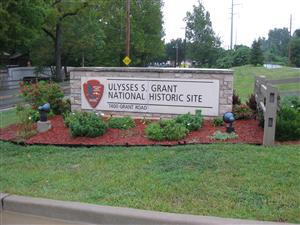 |
| The site is in suburban St. Louis, Missouri |
Ulyssess S. Grant was the 18th president of the United States, while he did serve two terms as president and tried for a third, some of his presidency may have been plagued by a scandal called the Whiskey Ring. This may have made his term a little less remarkable. I think he is more memorable as the Union General during the American Civil War. He was a West Point graduate, and fought in the Mexican-American War. But then, he kind of lost his way until the Civil War started. Before the Civil War started, he spent much of his time at a Fort in St. Louis, he met his wife, Julia Dent, at her father's house in White Haven near downtown St. Louis.
White Haven is his wife's family's property. As houses go, it is not that grand or that big. There is a substantial amount of land. The site is in the middle of suburban St. Louis and a bike path runs along it's entrance. The visitor's center has a nice film, and you can take a tour of the house itself. Because of the size, and lack of furnishings, the house is a quick tour. There are multi-media presentations there outlining St. Louis and Missouri's role in the American Civil war.
 |
| As presidential homes go, this one was rather modest in size. |
Being a border state in the Western Frontier presented some inner strife in Missouri, with a lot of individuals pro-union and others pro-slave. I think the official stance at the beginning of the war was neutral, but the Governor of Missouri had Southern sympathies. This was no different in Ulysses' own family. He was born and raised in Ohio, which was a free-state and his father was against slavery. This institution was not embedded in Ulysses character. His wife, Julia, was raised in a slave state (but still neutral during the beginning of the war), and was taught that whites could own slaves, this was a proper relationship. So when Ulysses Grant moved to his wife's family farm, he actually "owned" slaves through his father-in-law. He would work along side them during the day, and debate his father-in-law at night about this institution. When the Civil War broke out, Julia's own brothers fought for different sides of the war. You can see this conflict up close in some of the multi-media presentations at the house. Ulysses moved up the ranks on the Union side when the wore broke out, and was the General that ultimately received the surrender of Robert E. Lee at Appomattox Court House, VA.
 |
| Ulysses S. Grant appears on the $50 bill. |
When Ulysses S. Grant was president, and after his term was complete he did not spend much time at White Haven. He moved to New York to be close to his children. He also took a round the world trip that kept him from visiting Missouri for 2 years. The park is quaint, but not far from a lot of commercialization on nearby Gravois Street. The traffic (late on a Friday afternoon) was awful.
There are several national monuments dedicated to Grant. These include a statue of him and his horse on the National Mall and his tomb on the Upper West Side of Manhattan in New York.

No comments:
Post a Comment